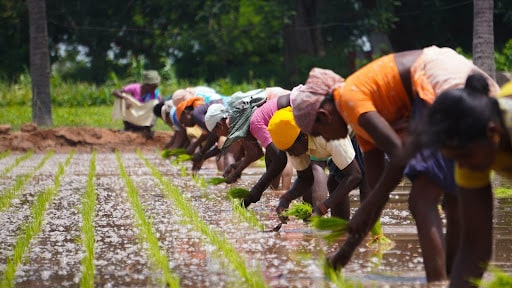In a decade marked by climate shocks, pandemia, and global interconnection, the call to #InvestInOurPlanet is top of mind for individuals and companies – not just for Earth Day but for the future of life and business as we know it. Food and beverage corporations sense the urgency to transition to more renewable sources for operations to continue and keep pace. Those at the forefront are promoting regenerative agriculture practices to secure long-term soil and watershed health. Others who ignore environmental sustainability in their supply chains override our planetary boundaries, borrowing prosperity from future generations at their own detriment. Climate resilience is essential for growers and buyers to feed 8 billion people by Earth Day 2023, and is a prerequisite for long-term feasibility of their supply chains.
Market teams are urgently pivoting amidst geopolitical complexities that jeopardize their security of supply, from Covid-driven supply chain interruptions to Ukraine-related price volatility for food and fertilizers. Perhaps socioeconomics, human rights, and cultural norms just aren’t perceived as material. And if people dynamics inside a company are complicated, who can begin to address the spectrum of gender and social issues within supplier communities? A just agricultural transition is too often an afterthought, with social sustainability a legacy child of CSR: nice to have, but immaterial to business.
As buyers already navigating financial and environmental factors, most food, beverage and ingredient companies taper off their interest in social impact and gender equity after a bit of philanthropy with women smallholders in a few test markets. Women’s Day celebrations and ads featuring an exceptional woman farmer are useful strategies. But more than consumer crumbs, true sustainability requires leaders who are unafraid to see and address the historical inequities that render women less commercially viable today. Agribusinesses are learning, on an accelerated track, how shortsighted “breadcrumbing” their social sustainability proves to be.
Women are the future of farming. As men shift to off-farm jobs, the proportion of women in the agricultural workforce has steadily risen in recent decades in all regions of the world except Europe. It’s little wonder how tremendous the shared value proposition is over the mid- to long-term, for buyers who empower women in sourcing communities with the resources, finance, capacity development, and personal agency to swim against the tide of inequities in land access, inputs, and commercial contracts.

It isn’t charity; gender equity pays. The oft-cited FAO stat estimates closing gendered agricultural access gaps could boost women’s yields by up to 30 percent, while McKinsey predicts that a “full-potential scenario” for women across sectors and jobs would add $28 trillion to global GDP. Investing in women’s economic empowerment is a no-regrets bet for a more productive private sector. Not to mention the operational continuity, consumer pressures averted, and brand equity companies stand to gain by mapping gender materiality and eliminating hidden risks to women. [And yet, existing agricultural sustainability certifications only go so far in their gender focus. Shoutout to the apparel sector for leading on gender risk mitigation and making strides to engender ethical sourcing.]
Securing executive buy-in to make women-focused investments in core business can be challenging for a private company with its own shareholder pressures and priorities. But on the spectrum of progress towards gender equality, each step is part of the corporate journey. Even those not yet invested in gender-transformative initiatives can begin intentionally including gender as a cross-cutting lens in business, from sourcing and climate goals to internal human resource management. Any brand with sustainable agriculture goals needs women at full potential in the supply chain, as women are essential to achieving climate resilience in origin communities and can lead the way as new practices and technologies are introduced.

PepsiCo for example established a Global Development Alliance (GDA) with USAID that aims to enhance supply chain performance by investing in women. ICRW Advisors and Resonance created a Supply Chain Empowerment Framework—based on development sector evidence for women’s economic empowerment, then synced with private sector realities so the company can “see itself” in the frame. GDA activities are making targeted investments in the economic empowerment of women as smallholders, labourers, and entrepreneurs. But companies don’t have to wait for a special project to integrate gender into core business operations. A simple way for multinationals to begin improving women’s agricultural potential at scale is to integrate gender criteria and inclusion practices in other sustainability initiatives across their global footprints. For instance, beyond the first four markets testing intentional women-focused investments, the GDA is now linking inclusion to PepsiCo’s broader agenda for people and planet by strategically embedding gender indicators into other “people pieces” of climate and livelihoods strategies.
Where there are people, there are gendered realities constraining performance. By engendering regeneration – incorporating concern for the different access of women and men to resources for the regenerative agricultural transition – companies can tap into a hidden factor for enduring supply chain success.
While women and girls are the most vulnerable to climate shocks and its socio-economic impacts, women equally offer companies some of the strongest pathways to climate and socio-economic resilience. Smart companies recognize the material gender dimensions of supply chains’ resilience. Women already labor, lead, communicate, and can make or break production and crop quality. If we continue with status quo ways of sourcing, where women don’t have access to the information and resources they need to professionalize regenerative farms, we will fail earth, and our businesses fail behind us. If we roll out sustainability initiatives with an intentional gender lens, climate adaptation and mitigation practices will enjoy much greater adoption and effect.

The most ambitious buyers will go on to pursue gender-transformative climate-resilient agribusiness, promoting more equitable resources, norms and practices in supply chains as they transition from extractive to holistically restorative models. Brave partnerships and digital inclusion will define how far they go. Only then can food systems unleash women’s full potential to advance sustainable businesses and foster deeper resilience in the communities that nourish the world.










